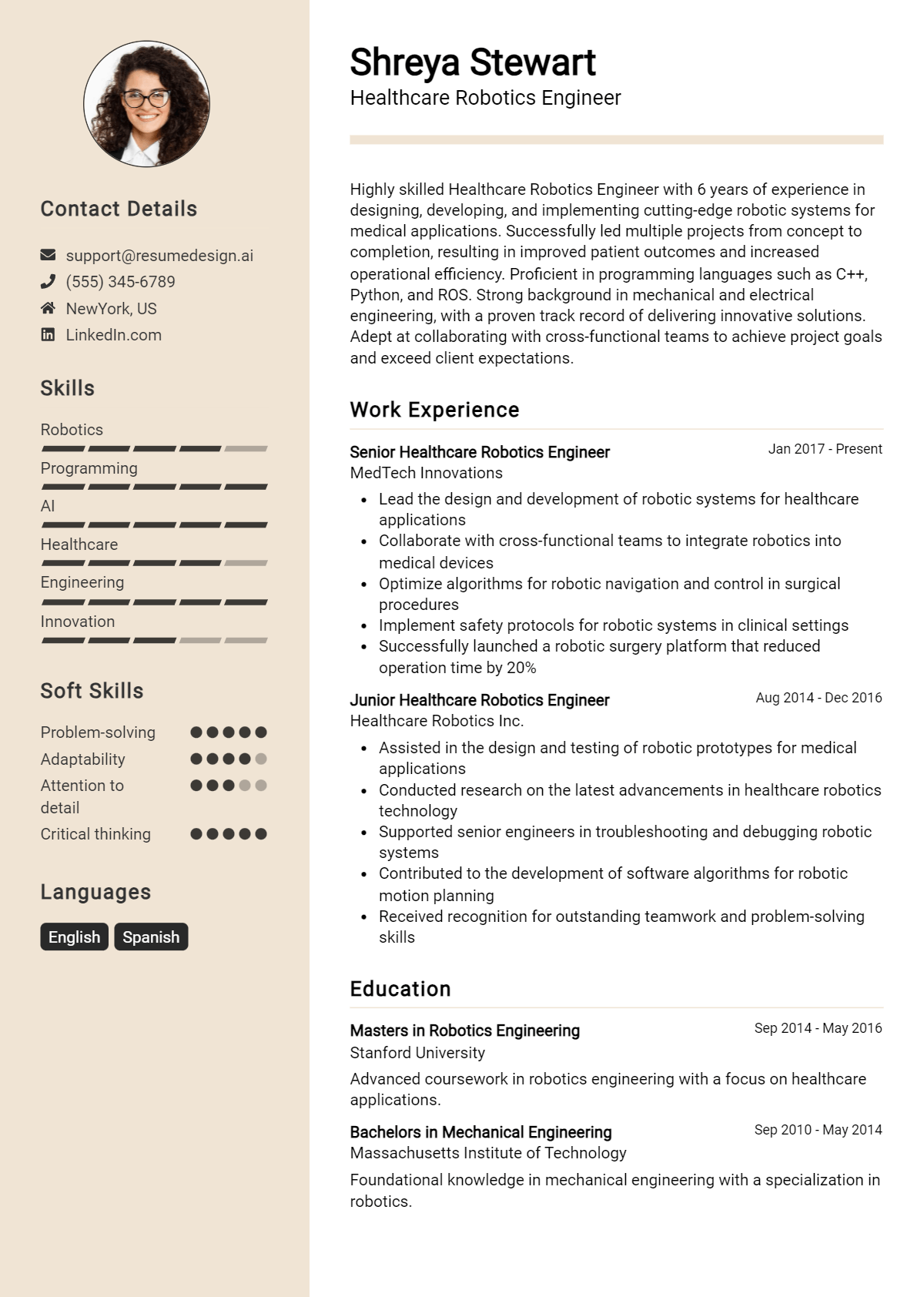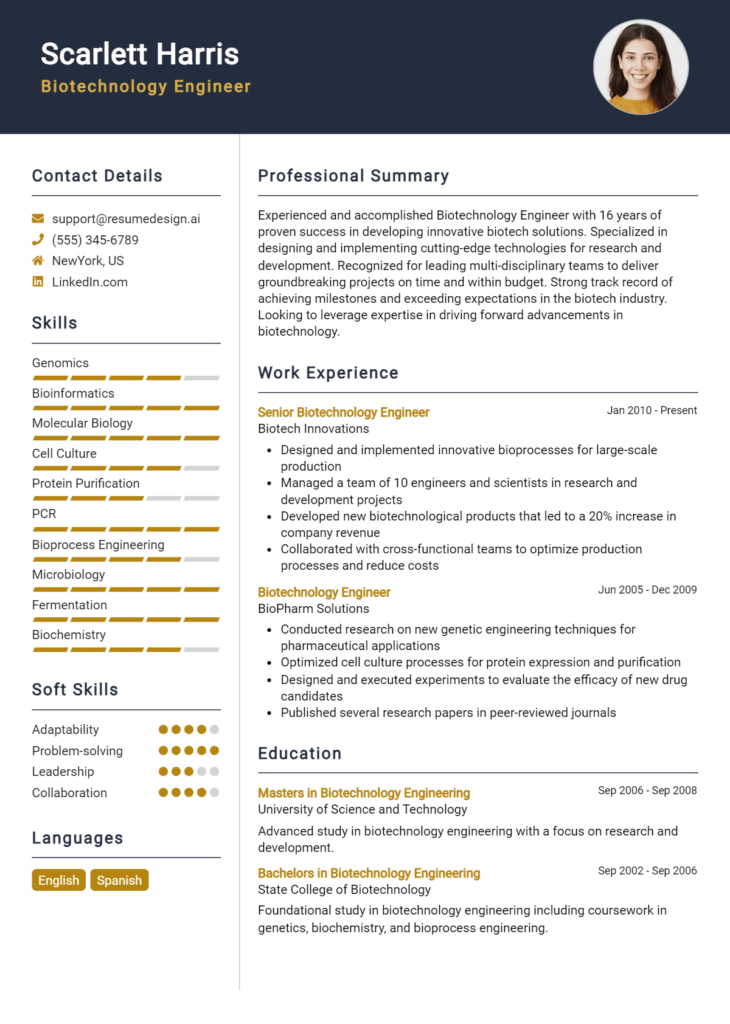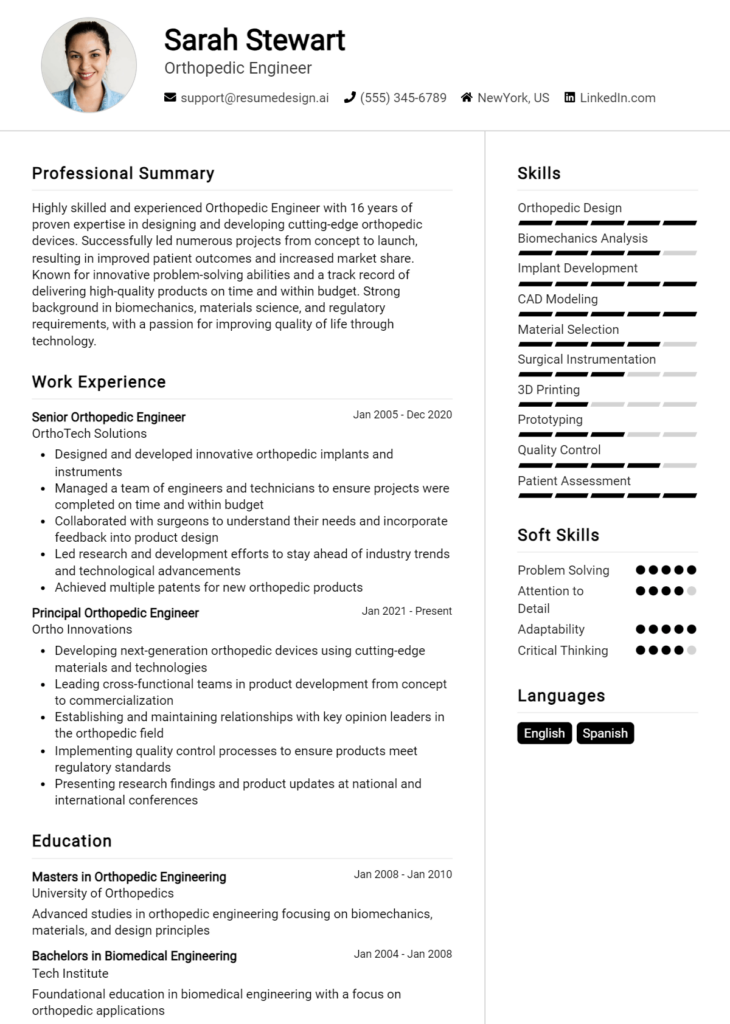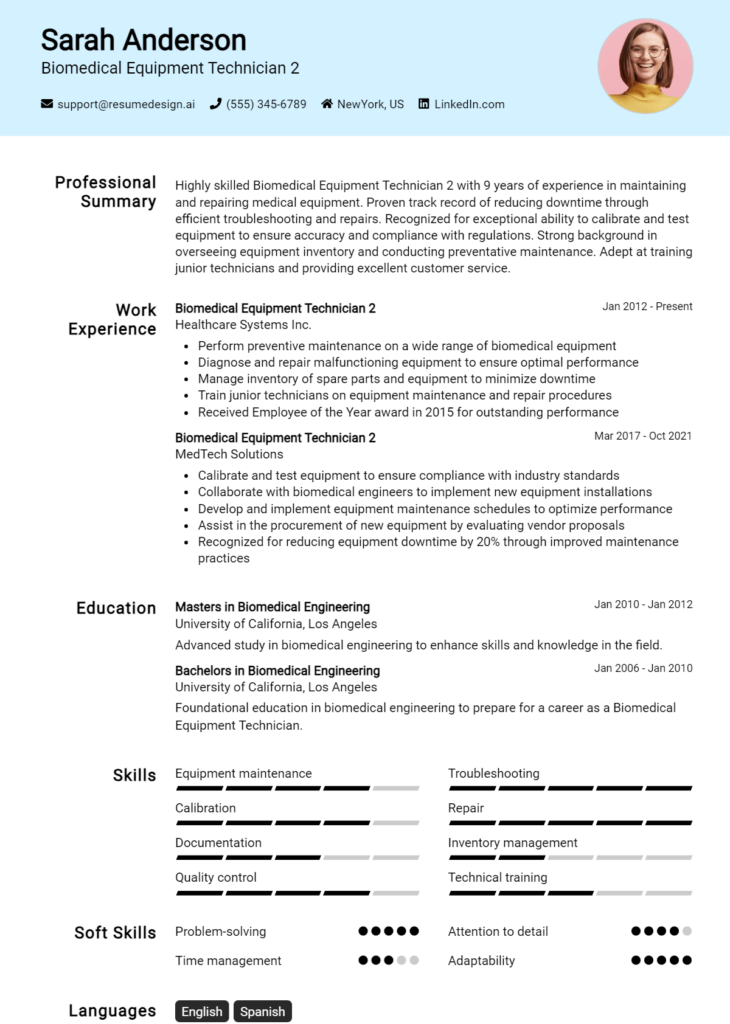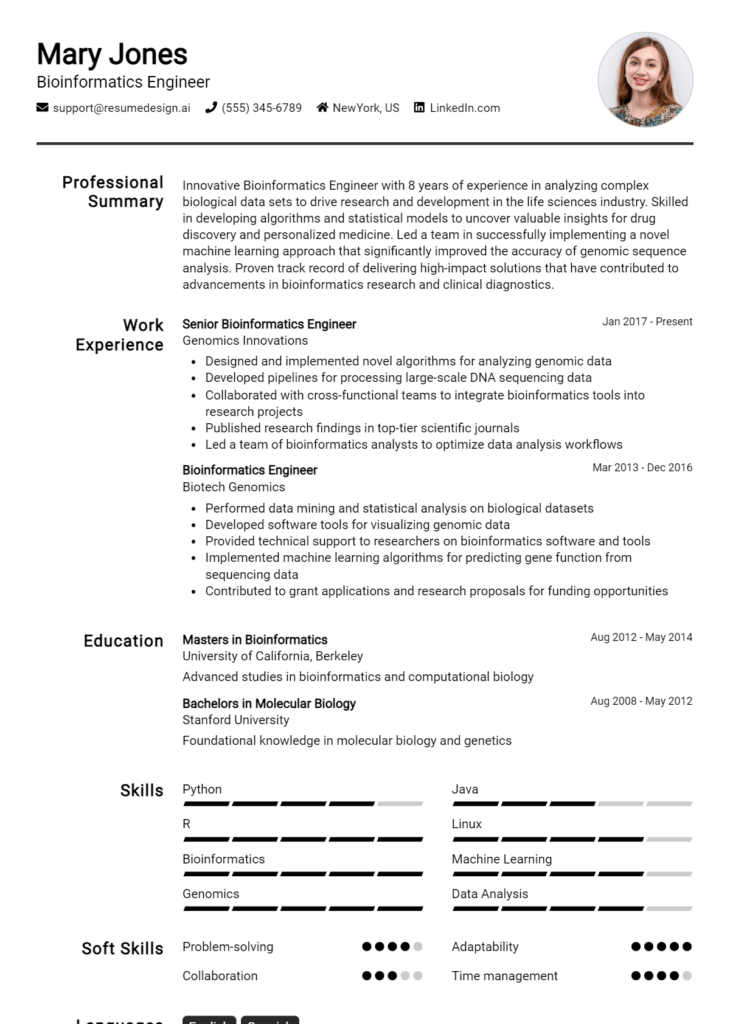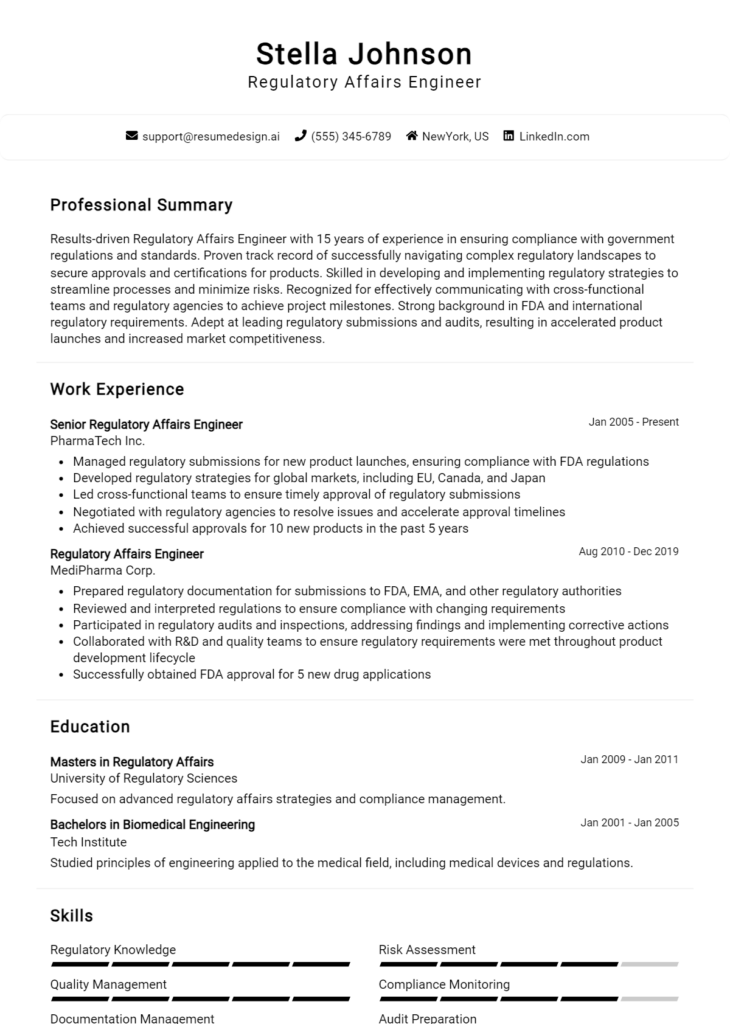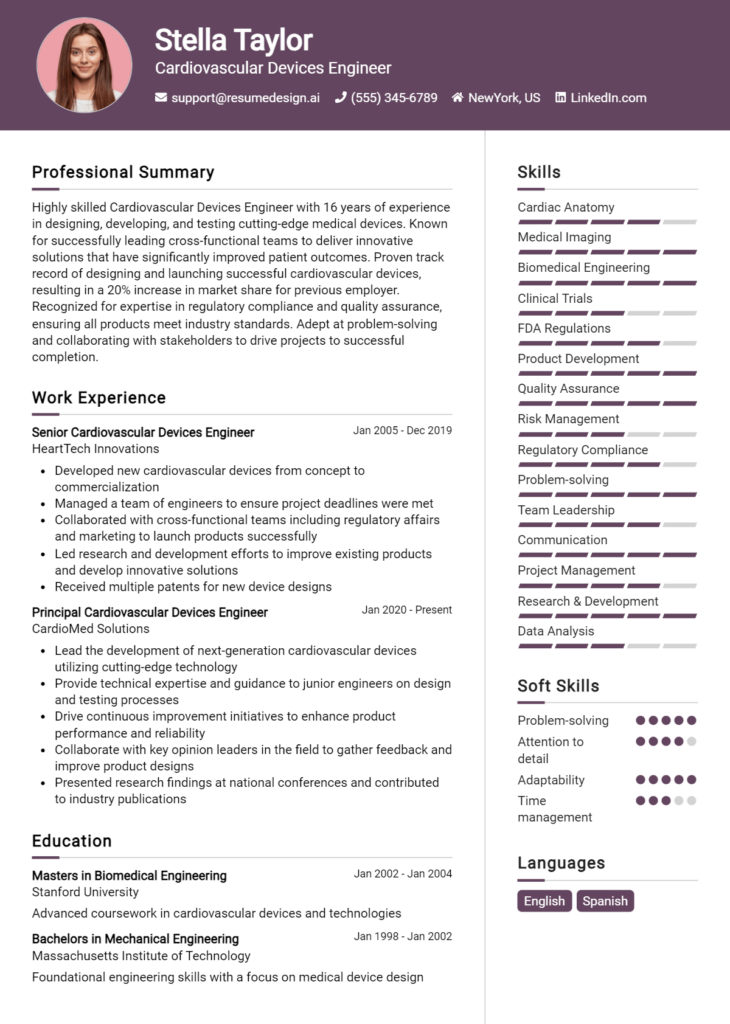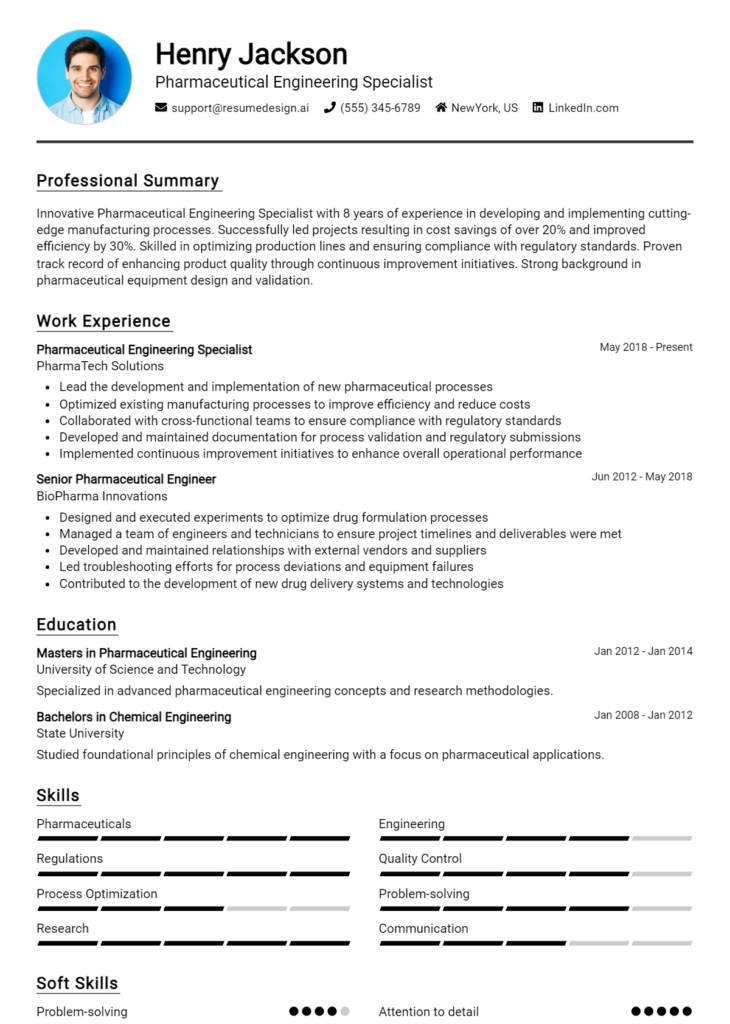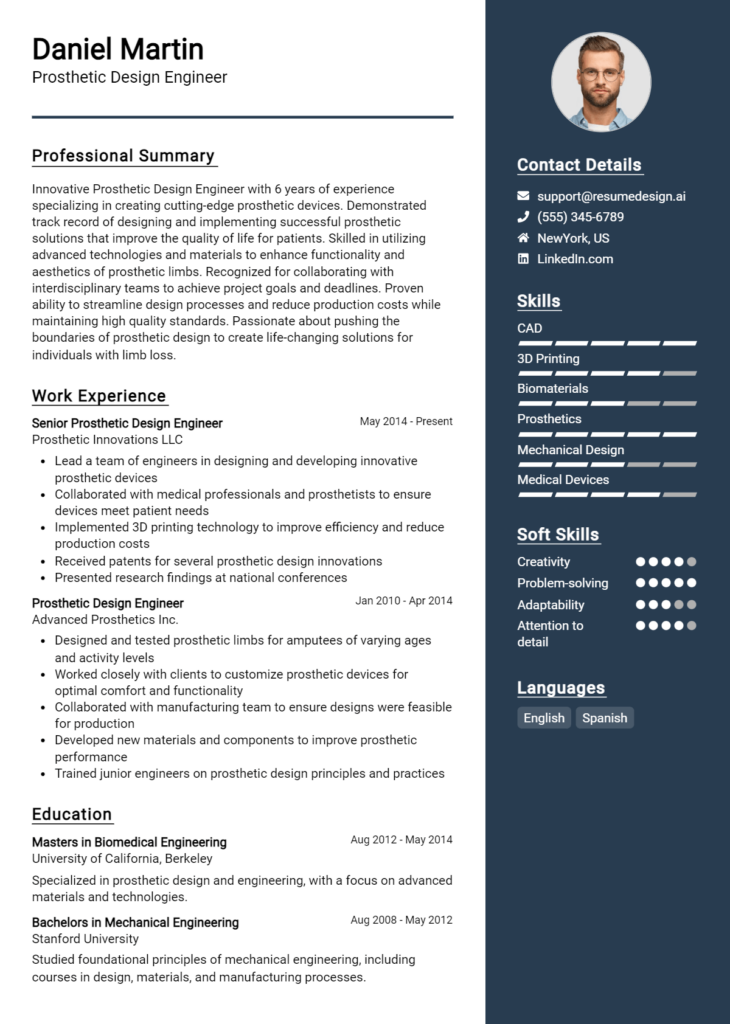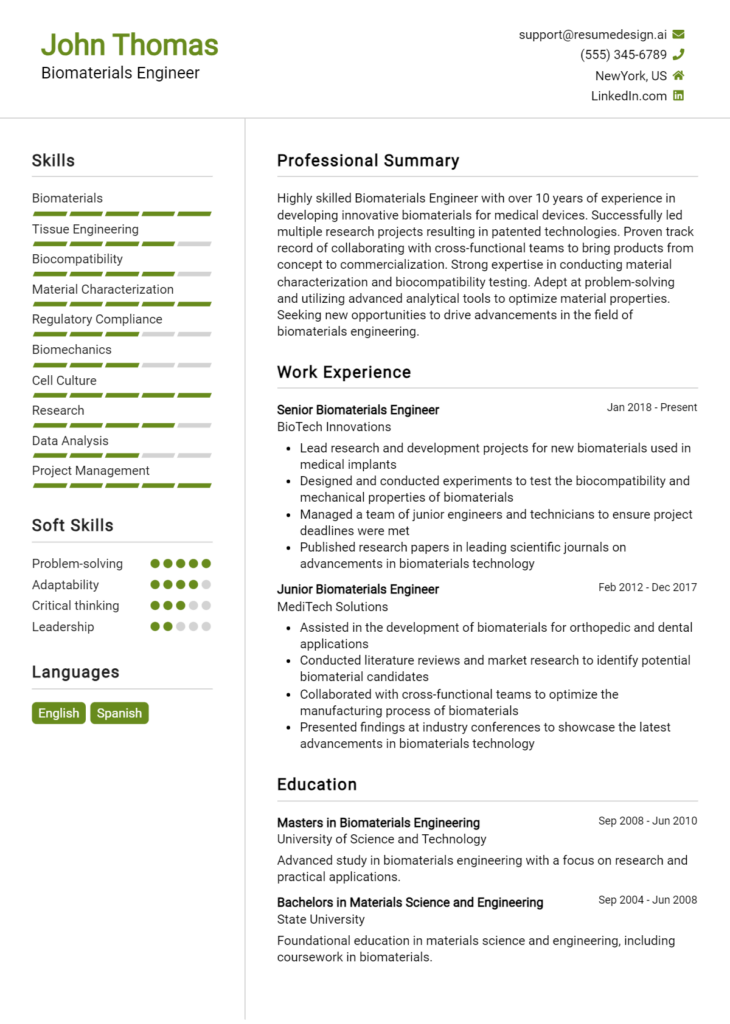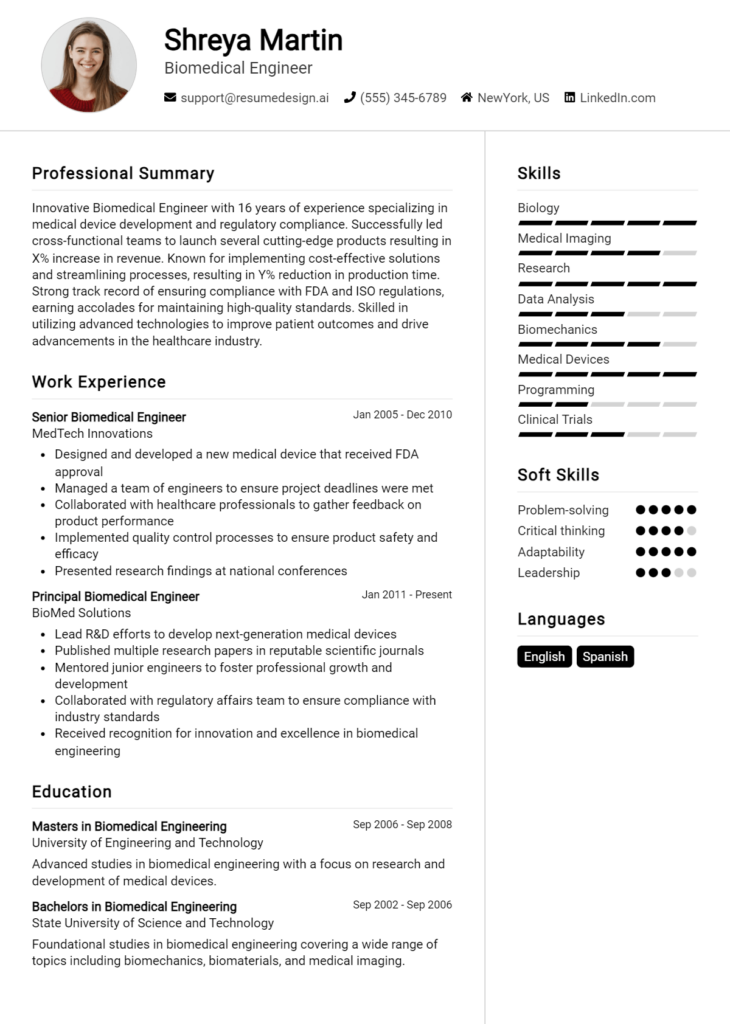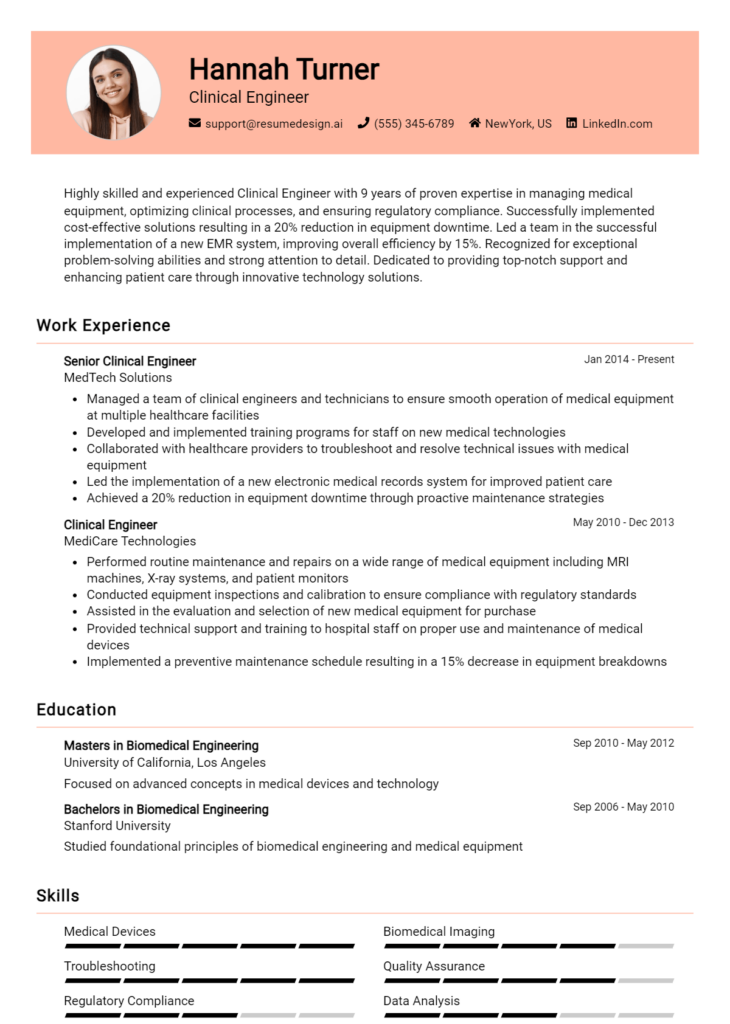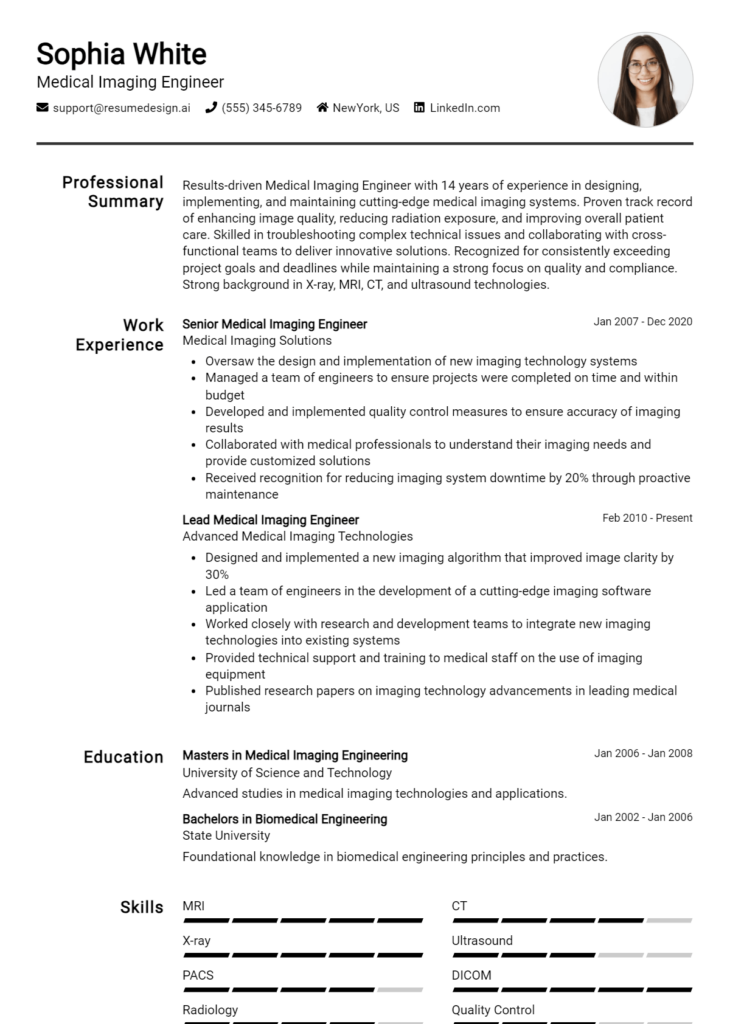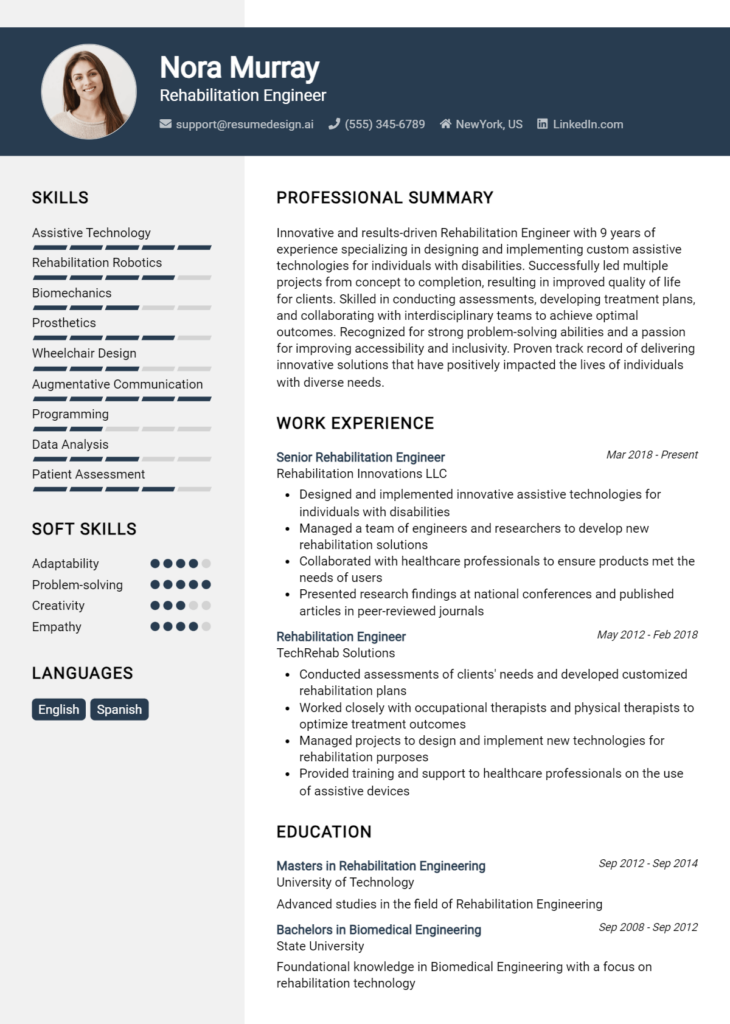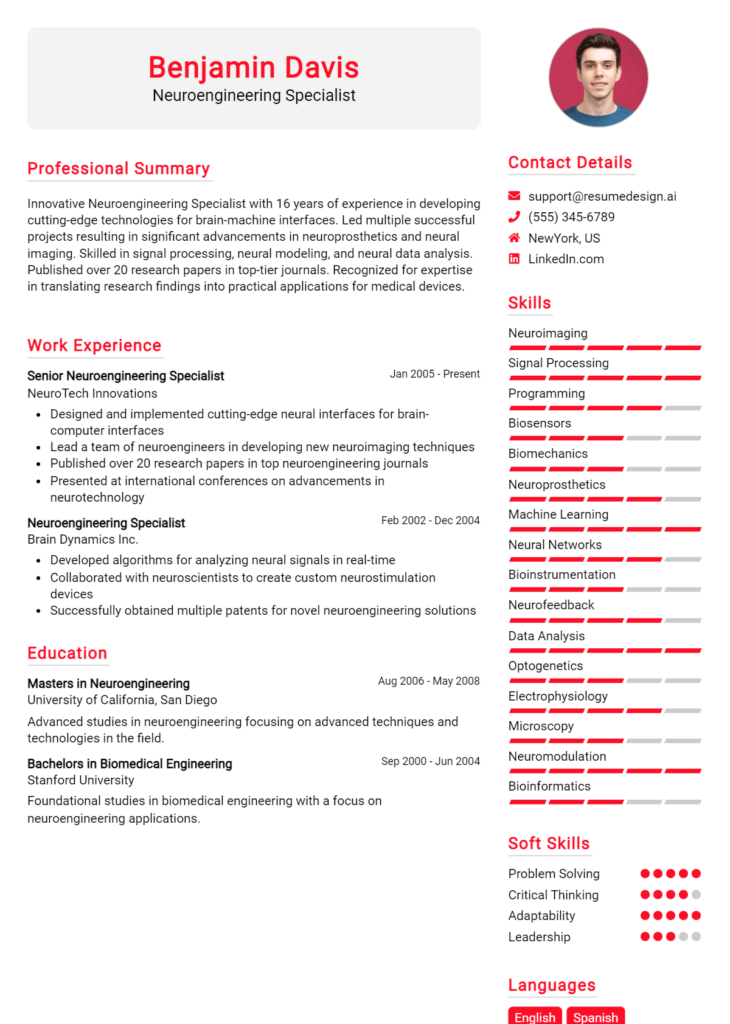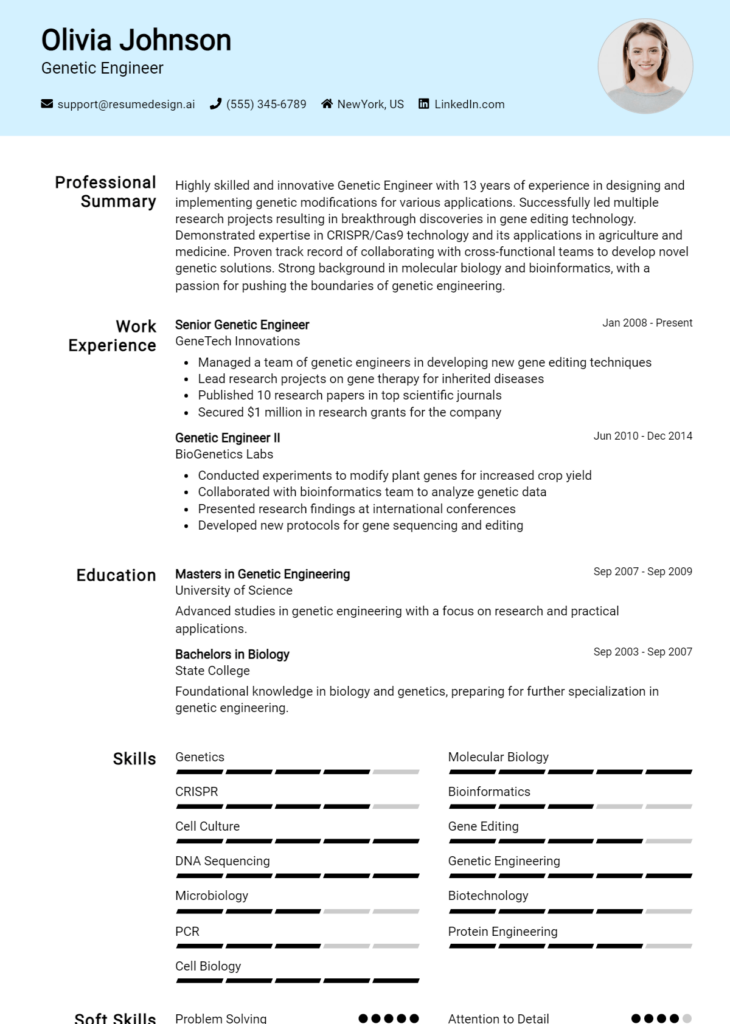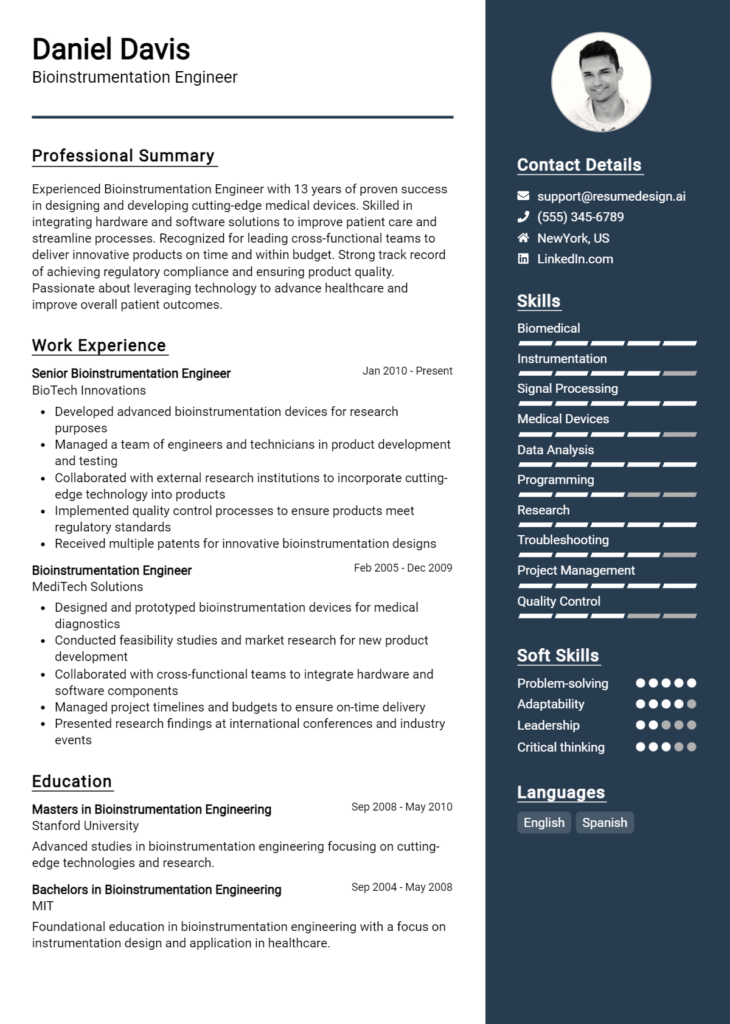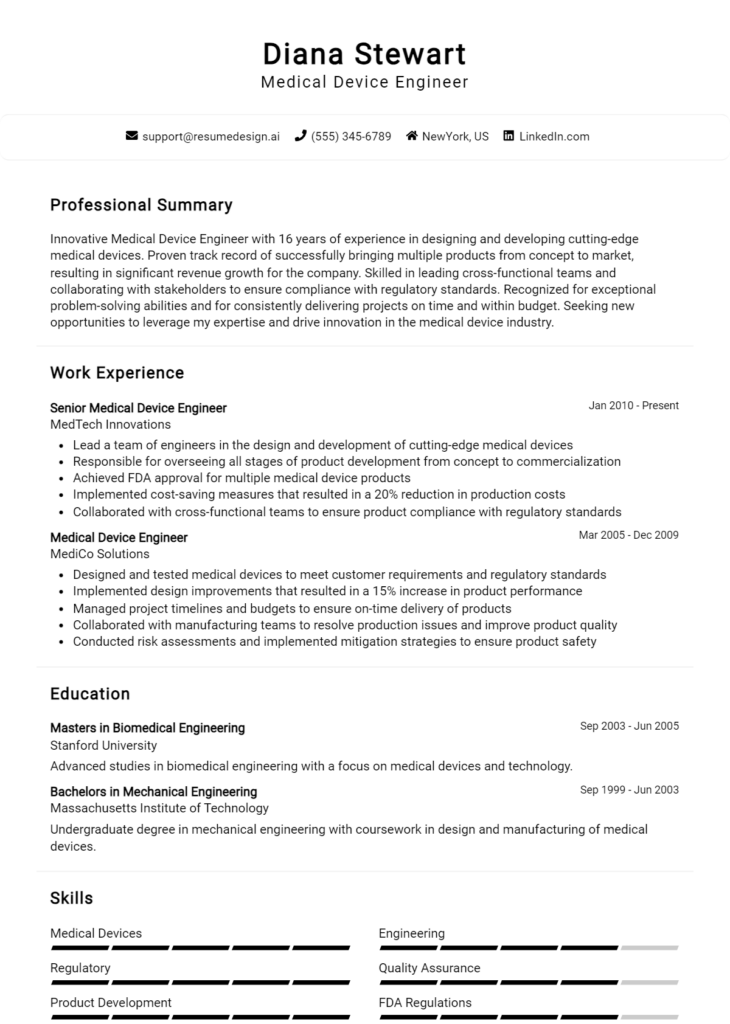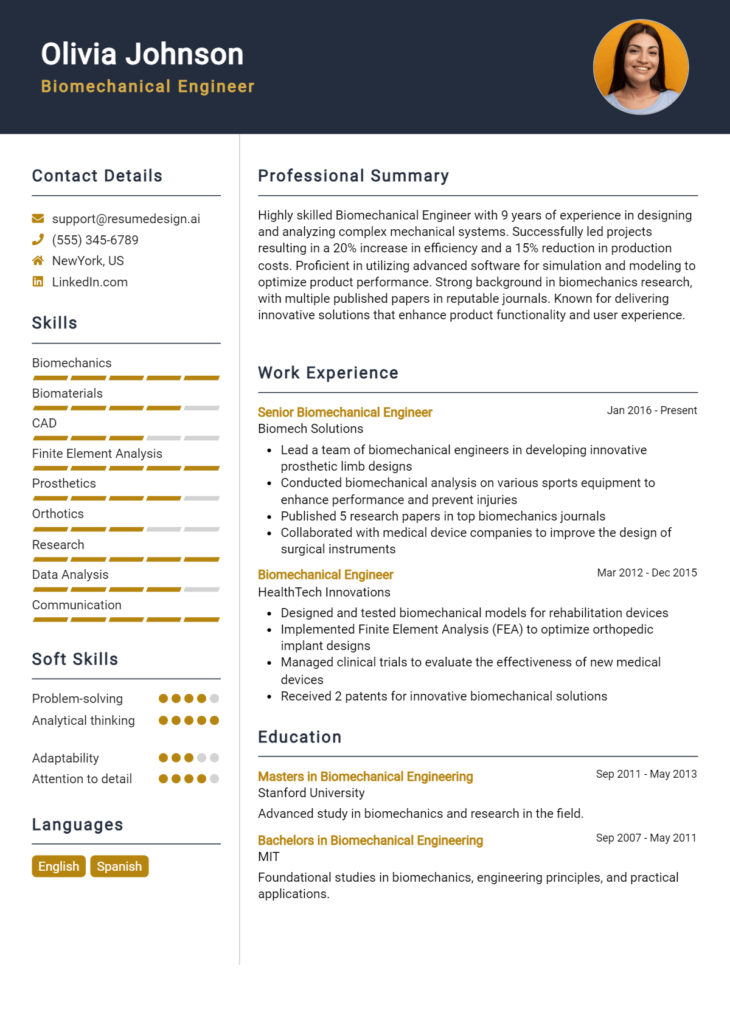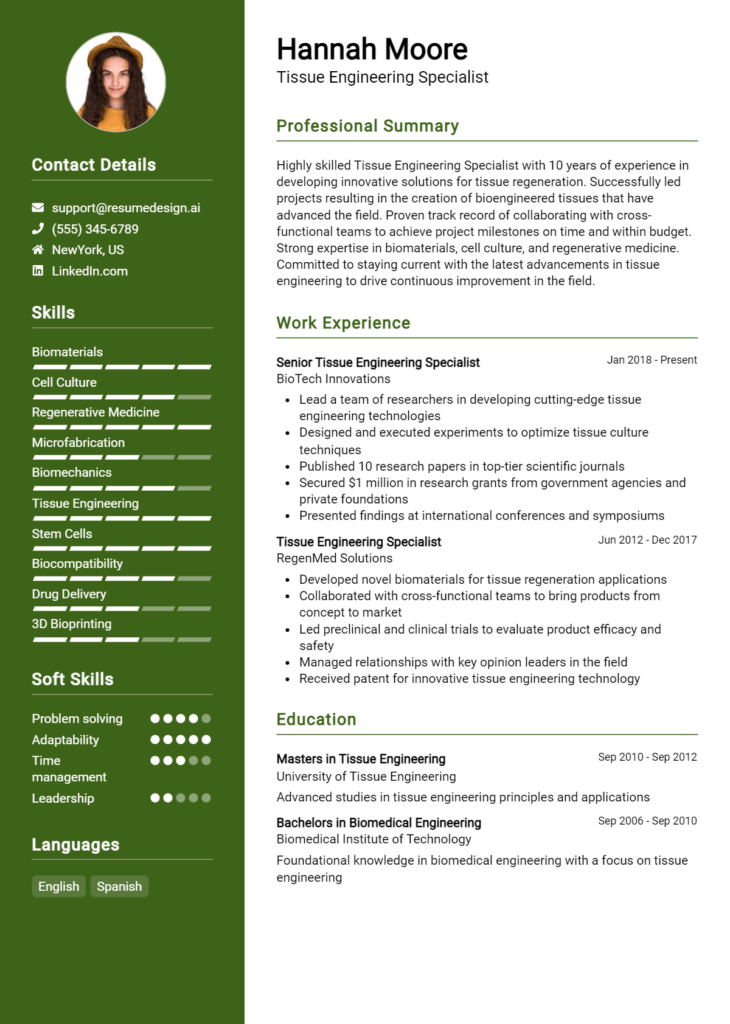Healthcare Robotics Engineer Core Responsibilities
A Healthcare Robotics Engineer is responsible for designing, developing, and maintaining robotic systems used in healthcare settings. This role requires strong technical expertise in robotics, as well as operational and problem-solving skills to ensure efficient integration across departments like engineering, surgery, and patient care. A successful engineer collaborates with multidisciplinary teams to enhance patient outcomes and streamline operations. Crafting a well-structured resume that highlights these competencies is essential for showcasing one's qualifications and alignment with the organization’s goals.
Common Responsibilities Listed on Healthcare Robotics Engineer Resume
- Design and develop robotic systems for surgical and rehabilitation applications.
- Collaborate with healthcare professionals to understand clinical needs and requirements.
- Conduct feasibility studies and risk assessments for new robotic technologies.
- Test and validate robotic systems to ensure compliance with safety standards.
- Provide technical support and training to healthcare staff on robotic systems.
- Maintain and troubleshoot robotic equipment to minimize downtime.
- Analyze data from robotic systems to improve performance and efficiency.
- Participate in research and development projects related to healthcare robotics.
- Stay updated with advancements in robotics and healthcare technologies.
- Document technical specifications and create user manuals for robotic systems.
- Work with regulatory bodies to ensure compliance with healthcare regulations.
High-Level Resume Tips for Healthcare Robotics Engineer Professionals
In the competitive field of healthcare robotics, a well-crafted resume is not just a document; it is your first opportunity to make a lasting impression on potential employers. As a Healthcare Robotics Engineer, your resume must effectively showcase your unique blend of engineering expertise, innovative problem-solving skills, and dedication to improving patient care through technology. It should reflect not only your technical abilities but also your professional achievements and contributions to the field. This guide will provide practical and actionable resume tips specifically tailored for Healthcare Robotics Engineer professionals, ensuring that you stand out in an ever-evolving industry.
Top Resume Tips for Healthcare Robotics Engineer Professionals
- Tailor your resume to the job description by using keywords and phrases that match the specific requirements of the position.
- Highlight relevant experience in healthcare and robotics, including internships, projects, or previous roles that demonstrate your expertise.
- Quantify your achievements with specific metrics, such as improving efficiency by a certain percentage or successfully deploying a robotic system that enhanced patient outcomes.
- Emphasize industry-specific skills, such as programming languages (e.g., Python, C++), robotics frameworks, and experience with automation technologies.
- Showcase any certifications or advanced degrees that pertain to healthcare, robotics, or engineering, as these can set you apart from other candidates.
- Include a section for relevant publications or presentations, particularly if you have contributed to academic or industry research in healthcare robotics.
- Utilize a clean, professional format that is easy to read, ensuring that your most important accomplishments are easily accessible.
- Feature soft skills that are crucial in healthcare settings, such as teamwork, communication, and adaptability, to demonstrate your ability to work effectively in multidisciplinary teams.
- Incorporate a summary or objective statement that clearly outlines your career goals and what you bring to the role, tailored to the healthcare robotics field.
By implementing these tips, you can significantly increase your chances of landing a job in the Healthcare Robotics Engineer field. A targeted and well-structured resume not only highlights your qualifications but also conveys your passion for advancing healthcare through robotics, making you a compelling candidate for potential employers.
Why Resume Headlines & Titles are Important for Healthcare Robotics Engineer
In the competitive field of healthcare robotics engineering, a well-crafted resume headline or title serves as a critical first impression. It has the power to immediately capture the attention of hiring managers, succinctly summarizing a candidate's key qualifications in just a few impactful words. A strong headline should be concise, relevant, and directly related to the job being applied for, ensuring that it resonates with the specific requirements of the role. By effectively highlighting a candidate's expertise and unique value proposition, a compelling resume headline can set the stage for the rest of the application, making it more likely to stand out in a crowded applicant pool.
Best Practices for Crafting Resume Headlines for Healthcare Robotics Engineer
- Keep it concise—aim for one impactful sentence or phrase.
- Use industry-specific keywords relevant to healthcare robotics.
- Highlight key skills and accomplishments that align with the job description.
- Ensure the headline reflects your years of experience or specific expertise.
- Avoid vague terms; be specific about your role or specialization.
- Tailor the headline to each job application for maximum relevance.
- Consider including quantifiable achievements to demonstrate impact.
- Use strong action verbs to convey confidence and capability.
Example Resume Headlines for Healthcare Robotics Engineer
Strong Resume Headlines
"Innovative Healthcare Robotics Engineer with 5+ Years in Surgical Automation Solutions"
“Expert in AI-Driven Robotics for Patient Care: Proven Track Record in System Design and Implementation”
“Certified Biomedical Engineer Specializing in Robotic Rehabilitation Technologies”
“Dynamic Robotics Engineer with Extensive Experience in Medical Device Development and Regulatory Compliance”
Weak Resume Headlines
“Engineer Looking for Job in Robotics”
“Healthcare Professional with Engineering Background”
The strong headlines are effective because they are specific, relevant, and packed with information that speaks directly to the needs of hiring managers. They communicate not only the candidate's qualifications but also their unique value within the healthcare robotics field. In contrast, the weak headlines fail to impress as they lack specificity and do not convey any meaningful insights into the candidate's skills or experience, making them forgettable in a competitive job market.
Work Experience Section for Healthcare Robotics Engineer Resume
The work experience section of a Healthcare Robotics Engineer resume is critical in demonstrating the candidate's technical skills and ability to lead teams in developing and delivering high-quality products. This section provides potential employers with tangible evidence of the candidate's expertise, showcasing their hands-on experience in the field of robotics within healthcare settings. By quantifying achievements and aligning work experience with industry standards, candidates can effectively communicate their value and readiness to contribute to innovative projects in the healthcare sector.
Best Practices for Healthcare Robotics Engineer Work Experience
- Highlight relevant technical skills specific to healthcare robotics, such as programming languages, robotic hardware, and software development tools.
- Quantify achievements with metrics, such as percentage improvements in efficiency or reductions in costs, to showcase impact.
- Emphasize collaborative projects, detailing your role in team dynamics and cross-functional collaborations.
- Use action verbs to convey leadership and initiative, reinforcing your active contributions to each project.
- Align your experience with industry standards and emerging technologies to demonstrate awareness of trends and best practices.
- Focus on problem-solving experiences that led to innovative solutions in healthcare robotics applications.
- Include certifications or specialized training relevant to robotics and healthcare to enhance credibility.
- Tailor your experiences to the specific job description, using keywords that resonate with the potential employer.
Example Work Experiences for Healthcare Robotics Engineer
Strong Experiences
- Led a team of 5 engineers in the design and development of a robotic surgical assistant, resulting in a 30% reduction in surgery time and a 15% decrease in patient recovery time.
- Implemented a machine learning algorithm that improved diagnostic accuracy by 25% in robotic-assisted imaging systems, enhancing patient outcomes and operational efficiency.
- Collaborated with interdisciplinary teams to integrate robotic systems into hospital workflows, achieving a 40% increase in staff satisfaction related to technology use.
- Managed a project that successfully reduced manufacturing costs by 20% through the optimization of robotic assembly processes, while maintaining product quality standards.
Weak Experiences
- Worked on robotics projects that were somewhat related to healthcare.
- Assisted in various tasks within the engineering team.
- Helped improve processes, but specific metrics or outcomes were not documented.
- Participated in meetings to discuss robotic systems, but did not have a defined role or impact.
The strong experiences listed above are considered impactful because they provide specific, quantifiable outcomes and demonstrate leadership and collaboration in meaningful projects. Each example outlines clear contributions to healthcare robotics, emphasizing results that align with industry goals. In contrast, the weak experiences lack specificity and measurable achievements, making them less compelling to potential employers. They fail to communicate the candidate's value and do not effectively showcase relevant skills or contributions to the field.
Education and Certifications Section for Healthcare Robotics Engineer Resume
The education and certifications section of a Healthcare Robotics Engineer resume plays a critical role in showcasing the candidate's academic qualifications, specialized training, and ongoing professional development. This section not only highlights the foundational knowledge acquired through formal education but also emphasizes industry-relevant certifications that validate the candidate's expertise in robotic technologies and healthcare applications. By providing relevant coursework, certifications, and specialized training, candidates can significantly enhance their credibility and demonstrate alignment with the specific demands of the Healthcare Robotics Engineer role, making them more appealing to potential employers.
Best Practices for Healthcare Robotics Engineer Education and Certifications
- Prioritize relevant degrees such as a Bachelor's or Master's in Robotics, Biomedical Engineering, or a related field.
- Include industry-recognized certifications, such as Certified Robotics Technician (CRT) or Certified Automation Professional (CAP).
- Detail any specialized training in robotic systems, programming languages, or healthcare technologies.
- List relevant coursework that showcases knowledge in areas like machine learning, computer vision, or human-robot interaction.
- Highlight continuous learning efforts through workshops, online courses, or conferences related to healthcare robotics.
- Keep the information concise and focused on qualifications that directly enhance the candidate's fit for the role.
- Use bullet points for clarity and easy readability, ensuring each item is clearly defined.
- Avoid including irrelevant or outdated qualifications that do not pertain to the healthcare robotics field.
Example Education and Certifications for Healthcare Robotics Engineer
Strong Examples
- Bachelor of Science in Biomedical Engineering, University of California, Berkeley, 2020
- Master of Science in Robotics, Georgia Institute of Technology, 2022
- Certified Robotics Technician (CRT), Robotics Industries Association, 2021
- Coursework in Machine Learning and Healthcare Robotics, Coursera, 2023
Weak Examples
- Bachelor of Arts in History, University of Texas, Austin, 2015
- Certification in Microsoft Office Suite, 2019
- High School Diploma, Anytown High School, 2010
- Outdated certification in Basic Robotics, 2010
The strong examples listed above are considered relevant because they directly align with the skills and knowledge required for a Healthcare Robotics Engineer, showcasing both educational attainment and recognized certifications. In contrast, the weak examples are deemed inadequate as they reflect unrelated fields or outdated qualifications that do not contribute to the candidate's capability in the healthcare robotics sector, potentially diminishing their appeal to employers.
Top Skills & Keywords for Healthcare Robotics Engineer Resume
In the rapidly evolving field of healthcare, the role of a Healthcare Robotics Engineer is becoming increasingly vital. This position not only requires a strong technical foundation but also a diverse set of skills that can drive innovation and improve patient outcomes. Crafting a compelling resume as a Healthcare Robotics Engineer hinges on highlighting these essential skills. A well-structured resume that showcases both hard and soft skills can significantly enhance your appeal to potential employers, demonstrating not only your technical capabilities but also your ability to collaborate and adapt in a multidisciplinary environment.
Top Hard & Soft Skills for Healthcare Robotics Engineer
Soft Skills
- Excellent communication skills
- Problem-solving abilities
- Team collaboration
- Adaptability to new technologies
- Attention to detail
- Critical thinking
- Time management
- Creativity and innovation
- Customer-focused mindset
- Ethical decision-making
Hard Skills
- Proficiency in programming languages (e.g., Python, C++)
- Knowledge of robotics systems and technologies
- Experience with machine learning algorithms
- Understanding of medical device regulations and standards
- Familiarity with CAD software for design (e.g., SolidWorks)
- Robotics simulation software expertise
- Data analysis and statistical methods
- Sensor integration and control systems
- Experience with embedded systems
- Knowledge of artificial intelligence applications in healthcare
By emphasizing these skills and showcasing relevant work experience, candidates can create a robust resume that effectively communicates their qualifications for a Healthcare Robotics Engineer position.
Stand Out with a Winning Healthcare Robotics Engineer Cover Letter
I am writing to express my enthusiasm for the Healthcare Robotics Engineer position at [Company Name], as advertised on [Job Board/Company Website]. With a Master's degree in Robotics Engineering and over five years of experience in developing innovative robotic solutions tailored for healthcare applications, I am excited about the opportunity to contribute to your team's groundbreaking work. My passion for enhancing patient care through technology aligns seamlessly with your mission to revolutionize healthcare delivery.
In my previous role at [Previous Company Name], I successfully led a team in designing a robotic surgical assistant that improved precision and efficiency in minimally invasive procedures. This project not only reduced surgery times by 30% but also significantly decreased patient recovery periods. My expertise in programming, machine learning, and human-robot interaction has equipped me to tackle complex challenges in the healthcare sector. I am particularly drawn to [Company Name]'s commitment to integrating AI with robotics, as I believe this is the future of patient-centric care.
Furthermore, I pride myself on my collaborative spirit and communication skills, which I consider vital for working alongside healthcare professionals. By engaging with surgeons, nurses, and technicians, I have been able to gather invaluable insights that inform the design and functionality of robotic systems. I am eager to bring this collaborative approach to [Company Name], fostering an environment where innovative ideas can flourish and ultimately lead to improved patient outcomes.
Thank you for considering my application. I am excited about the possibility of joining [Company Name] and contributing to cutting-edge healthcare solutions. I look forward to the opportunity to discuss how my background, skills, and enthusiasms align with the goals of your team.
Common Mistakes to Avoid in a Healthcare Robotics Engineer Resume
When crafting a resume for a Healthcare Robotics Engineer position, it's crucial to present your skills, experience, and qualifications effectively. However, many candidates make common mistakes that can detract from their chances of landing an interview. Understanding these pitfalls can help you create a more compelling resume that stands out to potential employers in a competitive field.
Lack of Specificity: Failing to tailor your resume to the specific job description can make you seem unfocused. Use keywords from the job posting to align your experience with the employer's needs.
Overemphasis on General Skills: While technical skills are important, focusing too much on general engineering abilities without highlighting specific expertise in robotics or healthcare can weaken your application.
Ignoring Relevant Experience: Not including relevant projects, internships, or research related to healthcare robotics can leave hiring managers questioning your qualifications. Ensure that all pertinent experiences are clearly outlined.
Poor Formatting: A cluttered or difficult-to-read resume can frustrate reviewers. Use a clean layout with clear headings, bullet points, and consistent formatting to enhance readability.
Vagueness in Achievements: Using vague language when describing your accomplishments can dilute their impact. Quantify your achievements with specific metrics or outcomes to demonstrate your contributions effectively.
Neglecting Soft Skills: Focusing solely on technical skills without mentioning soft skills like communication, teamwork, and problem-solving can present an incomplete picture. Highlight your ability to work collaboratively in multidisciplinary teams.
Failure to Update: Submitting an outdated resume can lead to missed opportunities. Regularly update your resume to reflect your latest projects, skills, and experiences in the rapidly evolving field of healthcare robotics.
Ignoring Professional Development: Not mentioning ongoing education, certifications, or workshops related to robotics or healthcare technology can suggest a lack of commitment to professional growth. Include any relevant training to showcase your dedication to staying current in the field.
Conclusion
As the demand for innovative solutions in healthcare continues to grow, the role of Healthcare Robotics Engineers has become increasingly vital. In this article, we explored the key responsibilities of this position, including designing, developing, and implementing robotic systems that enhance patient care and improve surgical precision. We also highlighted the importance of interdisciplinary collaboration, as Healthcare Robotics Engineers must work closely with medical professionals, software developers, and engineers from various fields to create effective solutions.
Moreover, we discussed the essential skills required for success in this role, such as proficiency in robotics programming, a solid understanding of medical systems, and strong problem-solving abilities. The integration of artificial intelligence and machine learning into robotic systems is also revolutionizing the healthcare landscape, making the need for skilled engineers in this area more critical than ever.
In conclusion, if you aspire to be a part of this exciting field, it's essential to have a well-crafted resume that showcases your skills and experience effectively. Take a moment to review your Healthcare Robotics Engineer resume and ensure it reflects your qualifications and achievements. To assist you in this process, consider utilizing resources such as resume templates, a resume builder, and resume examples. Don't forget to enhance your application further with customized cover letter templates. Start refining your resume today and take the next step towards your career in healthcare robotics!

